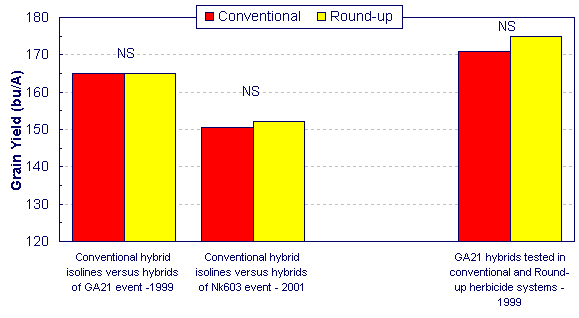
How are Round-up Ready Corn Hybrids Performing?
April 11, 2002 9(5):32
Joe Lauer, Corn Agronomist
Some farmers perceive that herbicide resistant crops are inherently lower yielding
than conventional hybrids due to yield drag or yield lag. The Monsanto Roundup Ready
GA21 event was first released to growers on a limited basis in 1997. The event Nk603
was first released to growers in 2000. Both events are approved in all countries
except the European Union. Experiments were conducted throughout the Midwest U.S.
with the objectives: 1) to determine if Roundup Ready genes suppress yield, and
2) to determine the effect of Roundup Ultra on Roundup Ready hybrids.
University corn agronomists from Wisconsin, Iowa, Nebraska, Missouri, Ohio, North
Dakota, Pennsylvania, Minnesota, and Michigan recently tested hybrids containing
the Round-up Ready events. In 1999, 10 hybrid pairs, one hybrid with the GA21 Roundup
Ready event, the other without (genetic isolines) were compared. In another experiment,
seven Roundup Ready hybrids were grown in conventional and Roundup Ultra herbicide
systems. In 2001, six hybrid pairs were evaluated.
Averaged across years and locations, no statistical differences were observed between
hybrids with the GA21 and Nk603 Roundup resistant events (Figure 1). The Roundup
Ready gene or its insertion did not affect yield. Glyphosate (Roundup Ultra) had
no effect on Roundup resistant hybrids. Based on these preliminary studies at numerous
locations there is no evidence of yield suppression associated with Roundup Ready
corn technology.
